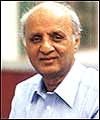 |
| The DPC Plant: Mothballed, but
not for long |
It
never rains, it pours. on march 20, Enron Mauritius and Enron India
Holding, the two holding companies for Dabhol Power Company filed
for Chapter 11 in a New York court. The two companies were the vehicles
through which Enron invested in DPC.
A day later Indian lenders to the company,
including IDBI, IDBI, ICICI, State Bank of India, and IFCI (total
exposure: Rs 5,200 crore), filed a petition in the Bombay High Court,
seeking the appointment of a court receiver for DPC. Their objective
was to ensure that the assets of the bankrupt Enron subsidiaries-that
includes DPC-do not become part of any international bankruptcy
proceeding. The Bombay High Court did so.
The counsel for the Indian lenders argued that the shares of the
investment vehicle in DPC were pledged with the Indian lenders for
the project. The counsel arguing for DPC said that the High Court
did not have jurisdiction over the project because the agreements
involved three other overseas defendants, Enron Mauritius, the Cayman-based
Enron India Holdings, and the Netherland based Offshore Production
CV.
The Indian lenders now hope to appoint a technical
assistant or a power company to operate the mothballed project.
Switching the power back on, they reason, could eventually help
them see light at the end of the tunnel.
-Roshni Jayakar
B-SCHOOLS
Autumn Sonata
Mumbai's S.P. Jain Institute scraps summer
placements and introduces autumn projects.
 |
| M.L. Shrikant: New ways |
When
you have 24 b-schools in Mumbai alone, doling out degrees and diplomas
by the thousands, for a dyed-in-the-wool institute there's only
one way out: be different from the pack. That's how the 20-year-old
S.P. Jain Institute of Management & Research (SPJIMR), ranked
amongst the top 10 in the country by sundry surveys, and the only
school in the country to offer a programme targeting scions of family-owned
and managed businesses has decided to react. And in pretty radical
fashion too.
For its flagship programme, the two-year post-graduate
diploma in business management, SPJIMR has decided to do away with
the customary summer internships that happen at the end of the first
year with autumn placements that take place in the middle of the
second year.
''Summer projects are a big hoax, offering
little scope for learning. The autumn projects will help bring a
greater interaction between industry and candidates, as companies
will now get a greater chance to view the candidate in greater depth,
and the candidate will get a chance to know the company much better
too,'' points out Manesh L. Shrikant, Honorary Dean, SPJIMR.
Indeed, many companies these days look at students
who come in for summer training as mere outsourcing options, and
little else. Often, the students end up working on market research
projects that involve lots of legwork and little application of
what they know. The original objective, of exposing students to
the world of business, isn't being met any longer. And the student
too isn't being equipped with enough learning in the first-year
curriculum to take advantage of the summer stint.
The 'autumns', on the other hand, provide an
opportunity for students to take on a project with a corporate for
eight weeks, and this is a part of the academic curriculum. The
institute and the company evaluate the student's report at the end
of the project separately. ''It's a great way of increasing interaction
between industry and the school,'' adds Shrikant, a DBA from Harvard.
Now, will the me-toos follow suit?
-Brian Carvalho
MADURA
GARMENTS
Madura Magic
With two Rs 100-crore brands, the company gears
up for more.
 |
| P. Nedungadi: Premium and popular
success |
Sluggish
demand for soaps and detergents may be one sure-fire indication
of the economic slowdown that's under way, but when it comes to
shirts and trousers consumers aren't really cutting back. That appears
to be the picture when you consider the financial report card of
Madura Garments, which was taken over by the A.V. Birla Group in
December 1999, and is now a division of Indian Rayon. Madura, which
owns such brands as Louis Philippe, Van Heusen, Allen Solly, Peter
England, and San Frisco, grew its topline by 14 per cent to Rs 288
crore for the nine months ended December 31, 2002 (in comparison
to the previous year's March to December period), and improved its
profit margins to 21 per cent from 19 per cent. ''Both premium brands
like Louis Philippe and Van Heusen, as well as popular brands like
Peter England and Allen Solly have registered significant growth,''
points out Prakash Nedungadi, President, Madura Garments.
One result of that improved showing, point
out industry sources, is that Louis Philippe and Peter England have
become Rs 100-crore brands in fiscal 2001-2002. That means that
the only garments brand ahead of the Madura stable is Raymond's
Park Avenue, with sales of roughly Rs 120 crore. Looks like Birla's
strategy of paying heavily for the brands (Rs 236 crore) is finally
paying off.
-Venkatesha Babu
 |
| Ravi Prasad: Back to basics |
HIMALAYA
DRUG COMPANY
Himalayan Ambitions
After flagging off Ayurvedic Concepts with
much fanfare three years ago, Himalaya Drug Company is going back
to the name it knows best.
For
decades, it was known largely as a one-product wonder. The Rs 250-crore
Himalaya Drug Company, had been riding on the growth and equity
of Liv 52, which is among India's top 10 pharma brands. Then, three
years ago, the company flagged off Ayurvedic Concepts, an umbrella
brand under which a host of new offerings were launched. That obviously
didn't prove a good idea; today Ayurvedic Concepts, which was flagged
off with much fanfare and a Rs 12-crore ad campaign, has gone out
the window, and the company has decided to stick with good old Himalaya
as the mother brand. ''Since multiple brand identities create dissonance,
we decided to bring all our brands under the Himalaya name. We believe
this enables us to communicate our offerings more clearly,'' explains
Ravi Prasad, 41, President and CEO, Himalaya Drug Company.
Prasad adds that the drive for a unified brand
will also help in focusing on global markets. ''Currently, only
around 14 per cent of our turnover comes from global sales, although
we are present in 56 countries. The global market for herbal healthcare
is estimated at $50 billion. We want a piece of the action. A global
thrust requires a consolidated brand identity.''
As part of its global push, Himalaya wants
to register its products as herbal medicines, and not as dietary
or food supplements, in European and American countries. A beginning
has been made, with countries like Switzerland having approved Liv
52 as a herbal medicine.
Meanwhile, in the domestic market the company
has launched a new range of 12 healthcare products under the ''Himalaya
Pure Herbs'' range. Philipe J. Haydon, General Manager (Marketing),
points out that herbs like Amla, Brahmi, Karela, Neem and Tulsi
have been used for centuries as special foods and additives for
the various benefits they confer. ''But what we are offering is
the concentrated goodness of herbs in capsule form. They are guaranteed
for highest quality and potency.'' These new products are expected
to fuel Himalaya's ambitions of doubling turnover to Rs 500 crore
by 2005. That surely calls for a Himalayan effort.
-Venkatesha Babu
KSA-TECHNOPAK
The Retail Axis
India's best known retail consultant goes courting.
 |
| Arvind Singhal: A step forward |
For
Arvind Singhal, the chairman of KSA-Technopak, this is but the next
logical step. Breaking news: India's best-known retail consultant
is hooking up with one of the country's leading it companies. Thus
far, KSA Technopak has operated as a 50:50 joint venture between
Kurt Salmon Associates, the venerable global retail consulting firm
and Technopak, a firm set up by Singhal in 1992. The JV was formed
in 1996; now both partners are diluting their stake to induct the
tech company, which Singhal refuses to name.
Singhal claims the new partner will help KSA
Technopak bag some large it spends in the retail segment that are
going abegging (or ending up elsewhere). An executive at a rival
consulting firm notes that the move could also help KSA's it outsourcing
activities in India. For the record, KSA was one of the earliest
companies to be associated with tech-major Infosys, but Singhal
neither confirms nor denies that Big I is KSA-T's new partner.
-Seema Shukla
|

